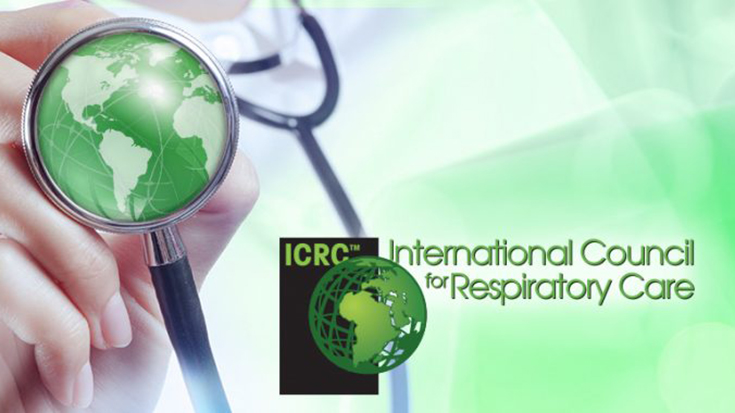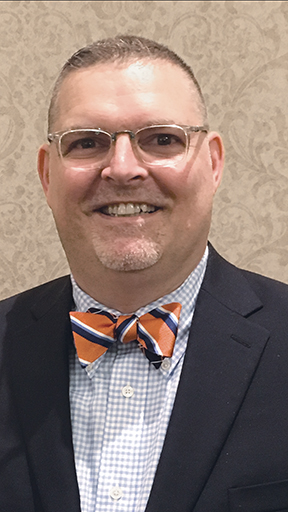
The COVID-19 pandemic has made one thing abundantly clear: it really is a small world, and what happens in one place on the planet can rapidly happen in every other place as well. Nearly three decades ago, the AARC established the International Council for Respiratory Care (ICRC) to ensure clear lines of communication between respiratory professionals around the globe. At no time has the ICRC been more important to the profession than it is now.
 Daniel D. Rowley, MSc, RRT, RRT-ACCS, RRT-NPS, RPFT, FAARC
Daniel D. Rowley, MSc, RRT, RRT-ACCS, RRT-NPS, RPFT, FAARCIn this interview, new ICRC President Daniel D. Rowley, MSc, RRT, RRT-ACCS, RRT-NPS, RPFT, FAARC, explains how the Council facilitates communication between American RTs and their colleagues in other countries, shares some information on what the Council has done since the pandemic, and offers some insight into his plans for the organization going forward.
Tell us a little about the ICRC for our readers who may not even know the Council exists. What is your core mission and why did the AARC form this group to address international aspects of respiratory care?
The ICRC consists of 28 Council members who are dedicated to our mission to advance the safe, effective, and ethical practice of respiratory care worldwide. In 1990, when Jerome Sullivan, PhD, RRT, FAARC, was AARC president, he launched the AARC’s International Fellowship program after talking with international respiratory therapists who attended the annual AARC Congress. This meeting platform and Fellowship program provided opportunities for the international respiratory care community to interact with U.S. RTs and observe respiratory care practice from within the U.S., where respiratory care was viewed as the gold standard for advancing formalized education, clinical practice, and research standards.
The ICRC was formed by Dr. Sullivan in response to growing interest from within the international respiratory care community to improve respiratory care within respective countries where formalized respiratory care training standards did not exist. The Council wanted to foster real time, bi-directional, international communication that would encourage the creation and growth of respiratory care organizations in individual countries while promoting respiratory care education, research, development, and the sharing of clinical practice guidelines for disease prevention and management.
What do you think are the top three ways the ICRC helps to promote the globalization of respiratory care and why do these stand out in your mind as most important?
The top three ways that the ICRC helps to promote the globalization of respiratory care include expanding an active communication network where knowledge exchange may occur, sharing of evidence-based clinical resources that promote improved patient outcomes, and recognition of quality respiratory care education seminars and other programs that meet or exceed contemporary education guidelines and are developed by international and U.S. educators and clinicians. Each of these efforts is important because we must not only network, but we must continue to share resources and enthusiastically invite others to join us as we work together to advance a shared mission to improve quality respiratory care education, patient care, and research.
COVID-19 has challenged respiratory care providers all over the planet this past year. How has the ICRC worked to help keep the channels of communication open between these providers so that everyone would have access to the quickly developing best practices for the treatment of the virus?
Indeed, COVID-19 has challenged respiratory care providers from around the world, but we — RTs — have risen to the challenge in the fight against this ominous virus. The ICRC network is strong. When COVID-19 was first beginning to appear in Wuhan, China, two of our Council members, Huyiqing Ge, MSc, RT, Governor for China and director of the department of respiratory therapy at Sir Run Run Shaw Hospital in Hangzhou, and Dr. Liang Xu, MD, ICRC Governor at Large and director of the critical care department at Wuhan Wuchang Hospital, were willing to share their early clinical experiences and evolving understanding of respiratory care COVID-19 disease management.
As COVID-19 expanded, Council members began to communicate more closely. Guillermo Nogales, MD, chief of ICU, from Lima, Peru, is a past AARC International Fellow, from 2010. He and two members of his respiratory therapy team submitted a paper describing their practice pre- and post-COVID and how the pandemic has allowed cardiopulmonary physiotherapists to emerge as important contributors caring for COVID-19 patients. Their article was published in the ICRC website’s News section.
Another example of how ICRC members and the international respiratory care community are networking to not only share information, but develop new information to help others better understand COVID-19 treatment strategies is highlighted by Jaber Alquahtani, MSc, respiratory therapist lecturer and researcher at Prince Sultan Military College of Health Sciences in Saudi Arabia. He invited Council members, past AARC International Fellows, and other international respiratory therapist and physician colleagues to participate in a research project that aimed to understand which ventilation techniques have been used to manage adult COVID-19 patients worldwide. This effort culminated with a paper published by the Journal of Multidisciplinary Healthcare on Nov. 18 of last year.
You just took over as president of the ICRC. What plans do you have to enhance the operation of the ICRC during your tenure and why do you think these initiatives are the right ones to target in the coming year and beyond?
My first priority as ICRC president is to actively promote and expand recognition of the respiratory care workforce as frontline health care team members who have specialized knowledge and skills that contribute to improved patient outcomes. During our virtual Business Meeting in December, it became clear that respiratory care professionals around the world have gained significant praise from other health care team members, hospital administrators, and government officials who recognize the important contributions we make in the fight against COVID-19.
The ICRC director of media communications, Khalid Alenezi, BSRC, RRT, from Arar, Saudi Arabia, and I have discussed a plan to conduct short video conference interviews with Council members and respiratory care professionals around the world to highlight what they do every day as respiratory care educators, clinicians, and researchers. These interviews will be posted on the ICRC website and distributed for mass viewing on new social network platforms that are being developed to reach persons interested in international respiratory care.
A second priority of mine is to actively engage Council members and past AARC International Fellows in broader networking and recruitment of others who may be interested in joining the ICRC. The AARC and ICRC have received several international inquiries over recent years asking for fundamental respiratory care training materials. Dr. Sullivan and Hassan Alahrani, BSRC, RRT, FAARC, developed a task force to develop a Fundamentals of Respiratory Care Support Course that includes chapter submissions from respiratory care professionals from around the world. The course is nearing final editing and it is expected to be finalized later this year.
My third plan is to promote the International Education Recognition System (IERS) with the formation of a standing committee, chaired by Arzu Ari, PhD, RRT, FAARC. The IERS formally recognizes educational programs worldwide that meet or exceed clearly defined guidelines approved by the ICRC.
These initiatives are all important because they aim to amplify recognition of respiratory care professionals around the world, encourage international respiratory care professional communication and knowledge exchange, and promote excellence in respiratory care education programs, clinical practice, and research.
Email newsroom@aarc.org with questions or comments, we’d love to hear from you.














